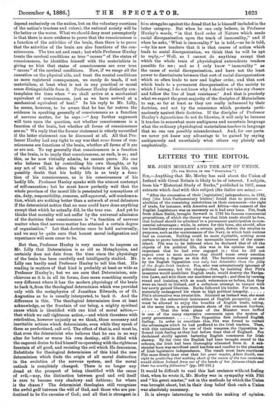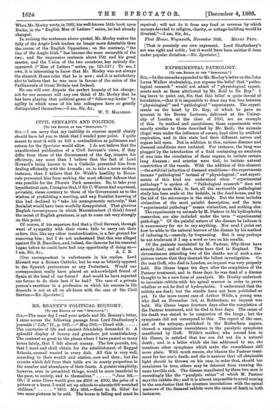LETTERS TO THE EDITOR.
MR. JOHN MORLEY AND THE ACT OF UNION.
Cr0 THE EDIT013 OF THE " BYECT/T011."] Sia,—Anything that Mr. Morley has said about the Union of Ireland with Great Britain is likely to be of interest. I subjoin, from his "Historical Study of Burke," published in 1867, some extracts which deal with this subject (the italics are mine) :— "After the concession of their [legislative] independence, in 1782,
they [the Irish Parliamentary leaders] found that to procure the abolition of the remaining restrictions on their commerce—the right
of trade, for instance, with America and Africa—the consent of the English Legislature was as necessary as it had ever been. Pitt, fresh from Adam Smith, brought forward in 1785 his famous commercial propositions, of which the theory was that Irish trade should be free, that Ireland should be admitted to a permanent participation in com- mercial advantages ; while, in return for this boon, she should, after her hereditary revenue passed a certain point, devote the surplus to purposes, such as the maintenance of the Navy, in whieh both nations had an interest. Nothing could be more equitable, nothing more certain to prove beneficial to the mercantile interest of the sister- island. Pitt was to be believed when he declared that of all the objects of his political life, this was in his opinion the most important that he had ever engaged in ; that he did not expect ever to meet another that should rouse every emotion in so strong a degree as this did. The factions course pursued by the English Opposition was only less detestable than the folly of the Anglo-Irish leaders. Fox, who was ostentatiously ignorant of political economy, led the charge,—first, by insisting that Pitt's measures would annihilate English trade, woald destroy the Naviga- tion Laws, and with them our maritime strength ; and then by turning round and insisting, with as much vehemence as before, that they were an insult to Ireland, and a nefarious attempt to tamper with her newly gained liberties. Burke followed his leader. For once, he materially endangered his claim to high political integrity Pitt's alternative was irresistible. Situated as Ireland was, she must either be the subservient instrument of English prosperity, or she must be allowed to enjoy the benefits of English trade, taking, at the same time, a proportionate share of the common burdens.
That the wise plans of the Minister were baffled is one of the many expressive comments upon the system of
party government The Opposition first inflamed English feeling. In order to conciliate this, Pitt was forced to curtail the advantages which he had proffered to the Irish traders. Then, with this curtailment for one of their weapons, the Opposition in- flamed Irish feeling as they had before done that of &gland. Fox declaimed shrilly against bartering English commerce for Irish slavery. By the time the English had been brought round to the scheme, the Irish had been thoroughly alienated from it. A sub- stantial boon was sacrificed amid bonfires and candles to the phantom of Irish legislative independence. The result must have convinced Pitt more firmly than ever that his great master, Adam Smith, was right in predicting that nothing short of the union of the two countries would deliver Ireland from out of the hands of her fatuous chiefs and their too worthy followers." (pp. 187-191.) It would be difficult to read this last sentence without feeling that, when he wrote it, Mr. Morley was in sympathy with Pitt and "his great master," not in the methods by which the Union was brought about, but in their deep belief that such a Union was absolutely necessary.
It. is always interesting to watch the making of opinion.
When Mr. Morley wrote, in 1882, his well-known little book upon Burke, in the "English Men of Letters" series, he had already changed.
In revising the sentences above quoted, Mr. Morley makes the folly of the Anglo-Irish leaders no longer more detestable than the course of the English Opposition ; on the contrary, "the line of the Anglo-Irish" has become the more excusable of the two ; and the impressive sentence about Pitt and his great master, and the Union of the two countries, has entirely dis- appeared. (" Men of Letters" series, pp. 125-127.) To me, I own, it is interesting to know that Mr. Morley was not always the staunch Home-ruler that be is now ; and it is satisfactory also to believe that he was once in favour of the union of the Parliaments of Great Britain and Ireland.
No one will ever dispute the perfect honesty of his change; not for one moment will any one think of Mr. Morley that he has been playing that political game of " follow-my-leader" by agility in which some of his late colleagues have so greatly distinguished themselves.—I am, Sir, &c., W. T. MALLEsoN.







































 Previous page
Previous page